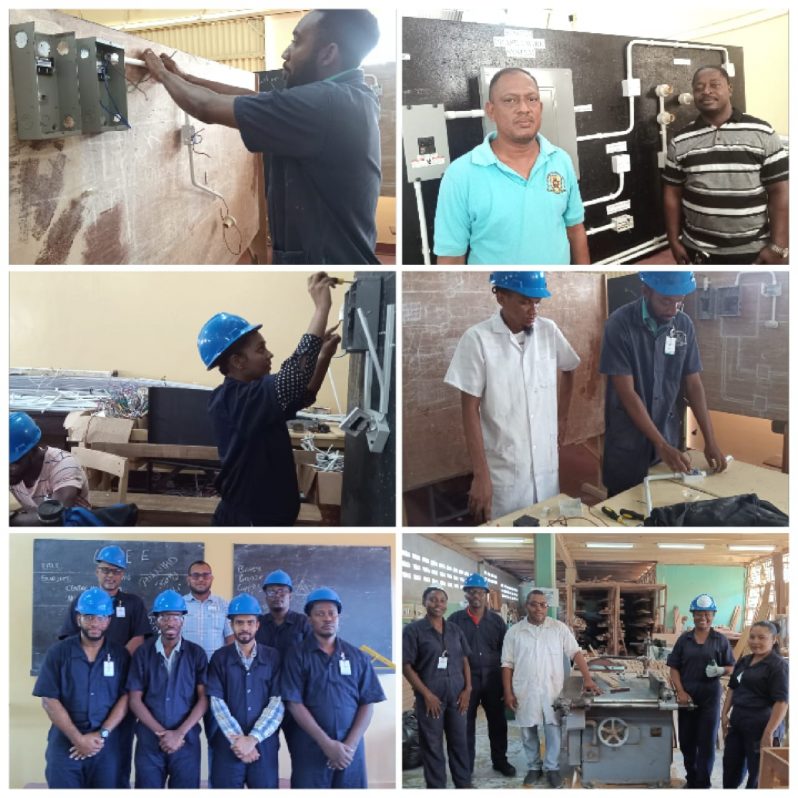TO ensure that teachers and students comprehend the Technical Vocational Education and Training (TVET) programme in Guyana’s schools, the Ministry of Education has arranged for eight weeks of practical training sessions. Twice a week, the Georgetown Technical Institute (GTI) hosts sessions that delve into electrical wiring, carpentry/joinery, and mechanical subjects.
Speaking exclusively with the Guyana Chronicle, one of the representatives from the TVET Unit, Donald Sanichara, explained that the teachers need to be “acquainted” with the Caribbean Vocational Qualifications (CVQs) level one.
According to Donald, “we cannot continue to have teachers in the system, who are producing level-one students but who themselves are not at the level-one stage.”
The aim, according to Mr. Sanichara, is to get the teachers trained in level one, and he also added that he’s optimistic that they will be trained ‘soon after’ in level two. He explained the teachers wouldn’t be as puzzled about the TVET course, but would have a full understanding of it after the training exercises are completed. He also added that the teachers would be in a better position to deliver more effectively to the students in the classroom.
The TVET representative also stated that they are hoping to get a lot of the TVET programmes out to the educators so that it can motivate them and the students to recognise the value and the importance of the subject and what it has to offer. “We commend Minister Manickchand for this initiative. What you find is that some persons will take the pre-vocational knowledge and move on to another field, so we are trying to help them see what they can gain and use it through their passion of teaching. What we also found is that most of our teachers were just teaching, but they were not given the exposure to what the subject is really about or what you can gain from it. In the past, it was basically chalk and talk; I am also asking that the teachers come on board with this programme. I know that some of them are scared of the subjects.
“While the programme may sound challenging with its in-depth record keeping and paperwork, every task is challenging at the beginning, but, after a one-year period, it will become easier,” Sanichara stated.
While skilled workers in the past were predominantly males, the female educators said that they were happy to report that those days were slowly changing, not only with adults but within the school system as well.
Miss Shivanie Lall (Plaisance Secondary, East Coast Demerara), Miss Rochelle Baptiste (Golden Grove Secondary, Demerara – Mahaica), Miss Raveena Reid (Leonora Secondary, Region Three), and Miss Marlyn Henry (North Ruimveldt Multilateral, Georgetown), shared similar sentiments in discussing the TVET training.
According to female teachers, high training standards ensure that they deliver the best curriculum to students, leading to high standards of outcomes. Despite being a practical subject, it also had an academic basis. Through hands-on experience, “we gained valuable knowledge and we expect our students to be just as thrilled.”
The teachers continued, “this training will be of great help to us and the students, but, more importantly, we are very happy to know that we are also empowering our female students. In our days at school, no female wanted to join the Tech streams, but now we are seeing a change in that; it is not in large numbers, but we are getting there.’’
Agreeing with what their female colleagues stated, the male teachers added that the TVET programme is of greater importance in the school system now than ever.
“The TVET is a hands-on and or practical-based programme that Guyana is in need of now. We have an economy that is growing, and we have to ensure that we grow with it as well. As teachers, we are happy that we are given these opportunities so that we can pass on the much-needed knowledge and skill to them. We have a lot of opportunities in the different sectors, but we have to equip ourselves by having these initiatives more frequently so that we can mould our students to be academically inclined and skills-ready to be in the demanding workforce, ” the male teachers collectively agreed.
The male teachers are Sir John Russel (Plaisance Secondary), Sir Jermain Lynch (Ann’s Grove Secondary, E. C. D), Sir Sheldon Durant (Kingston Practical Instructional Centre, Georgetown), Sir Devendranath Rooplall (Hope Secondary School, E.C.D), Sir Randy Mingo (Bladen Hall Multilateral Secondary, E.C.D), Sir Terry (Leonora Secondary), and Quincy Trotman (Charlestown Secondary, GT).
They further agreed that, “We would like to personally extend our heartfelt thank you to the Minister of Education, Priya Manickchand, and our President for having these initiatives in schools. We are also hoping and kindly asking that we can continue with level two of these programmes, enhance our schools with updated resources so that our children can be better informed and taught. We know that everything takes time, but we are grateful that the government can make these sessions available for us. It is empowering, and it also makes us feel good knowing that we, the students, the community, and society will benefit from this initiative.”
The teachers at GTI expressed their gratitude to the tutors, acknowledging their remarkable level of competency and thanking them for everything they taught them. “We are looking forward to continuing to work with them in the near future in level two and ever further.”



.jpg)








